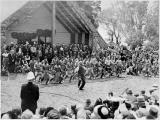The New Zealand Settlements Act enabled the confiscation (raupatu) of land from Māori tribes deemed to have ‘engaged in open rebellion against Her Majesty’s authority’. Pākehā settlers would occupy the confiscated land.
Land Confiscation
Events In History
Articles
Māori King movement - 1860-94

King Tāwhiao's reign was dominated by the Waikato War and the fallout from it. Read the full article
Page 4 - Raupatu
Under the terms of the New Zealand Settlements Act 1863 the government confiscated huge areas of Māori land in late
Page 5 - Maintaining Te Kīngitanga
By the early 1870s, the Kīngitanga was struggling. Living conditions within the Rohe Potae (the Māori King's territory) were poor. Allies such as Ngāti Hauā had resumed selling
The Treaty in practice
Amalgamating Māori into colonial settler society was a key part of British policy in New Zealand after 1840. Economic and social change, along with land-purchase programmes, were central to this process. Read the full article
Page 2 - Slide to war
War raged in the North Island in the mid-19th century. The period from 1860, when conflict broke out in Taranaki, through to about 1872, is commonly called the New Zealand Wars.
Pai Marire

Pai Marire (goodness and peace) was one of several new Māori faiths to emerge in the 19th century. Like many others, it was closely tied to issues of land and politics. Read the full article
Page 2 - Te Ua Haumēne
Pai Mārire disciples travelled around the North Island in the mid-1860s. Against a backdrop of war and land confiscations, the founding principle of Pai Marire was often subverted
Page 3 - The death of Carl Völkner
The killing of missionary Carl Völkner by Pai Mārire followers in 1865 shocked the colony. The government used the event to justify taking harsh action against the Pai Mārire
Treaty timeline

See some of the key events between 1800 and 1849 relating to the Treaty of Waitangi. Read the full article
Page 2 - Treaty events 1850-99
See the key events between 1850 and 1899 relating to the Treaty of
The Vogel era
In 1870, Colonial Treasurer Julius Vogel launched the most ambitious development programme in New Zealand’s history. The ‘Vogel era’ was a decisive moment in New Zealand’s 19th-century transformation from a Māori world to a Pākehā one. Read the full article
Page 4 - Building Vogel's railways
Julius Vogel wasn’t the first colonial politician to promise to fund public works and immigration with borrowed money. But the early 1870s offered better prospects for



